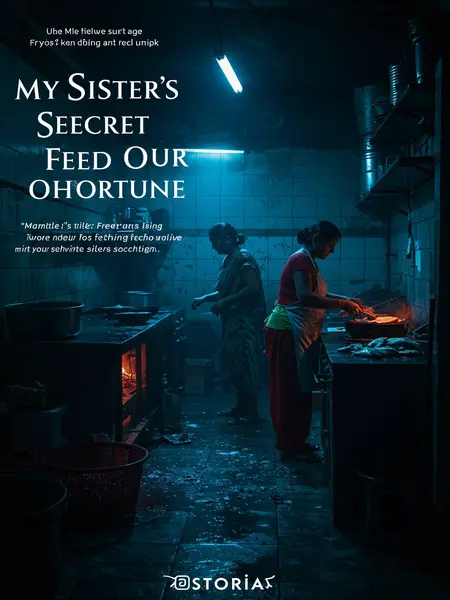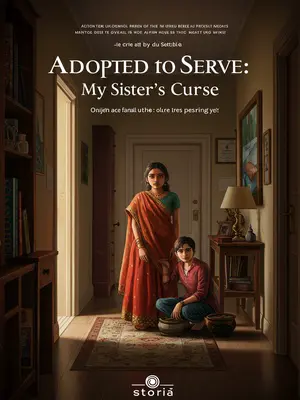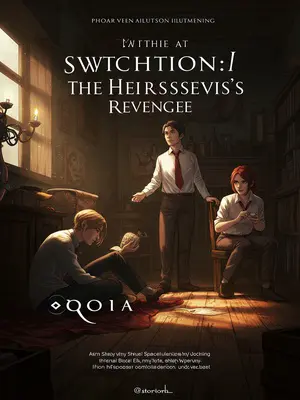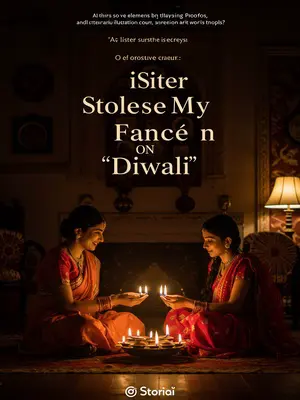Chapter 5: Neha’s Visit and Pomfret Day Drama
Neha and I have been together for over two years, but neither of us has told our families.
We’d met at a debate competition, arguing on opposite sides, then bonded over vada pav at the canteen. I loved her laugh, the way she tucked her hair behind her ear when she was thinking. But she always insisted we keep things low-key. Her parents were strict, and mine…well, my parents were a world apart.
Not that I didn’t want to—it was mostly because Neha didn’t agree. She said if our families knew, they’d rush us to get married, and she wanted a couple more years of freedom.
She loved her independence, dreaming of travelling, starting her own business. We joked about running away to Goa, but neither of us ever packed a bag. I respected her wishes, even though Ma would drop hints every time she called.
Of course, I respected her wishes.
It was the unspoken rule between us. She was practical, not one for Bollywood-style drama. I tried not to think about how much I wanted to introduce her to Ma, see her sitting at our dining table, laughing with Rupa.
This time, she took the initiative to say she wanted to visit my family’s shop. Naturally, I was thrilled, but thinking of the crowds, I hesitated.
I imagined her walking in, looking around at the chaos, then making fun of the fishy smell. I didn’t want her to see Dad shouting at customers or Rupa hiding in her room. But Neha was stubborn.
“The shop is really busy today—I might not be able to entertain you. How about coming tomorrow? There won’t be so many people then.”
I tried to sound casual, but she saw through me. She sent back a bunch of laughing emojis, insisting she’d manage.
“It’s fine. I don’t need you to take care of me. I’ve helped my parents with chores since I was little—maybe I can help out, too.”
I could picture her rolling up her sleeves, ready to jump in. She’d grown up in a joint family—no stranger to chaos.
Seeing her insist, I gave in and sent her the address.
I typed it out, warning her about the traffic and the waiting crowds. She replied with a thumbs up, saying, “I’m tougher than you think.”
“Didi, I’ve got something to do. I’m heading out.” I put away my phone, told my sister, and prepared to leave.
Rupa looked at me for a moment, then nodded. I thought I saw something like worry in her eyes, but she didn’t say anything.
She nodded and turned back to the bedroom.
I watched her disappear, feeling a pang of guilt for leaving her alone on pomfret day. The flat seemed to shrink behind me as I stepped out.
I don’t know if it was my imagination, but I noticed fine wrinkles at the corners of my sister’s eyes and neck. At a glance, she didn’t even look like a woman in her twenties.
Her skin looked tired, almost as if she was much older. I remembered how she used to be the prettiest girl in the village, always laughing. Now, she seemed to carry some invisible weight.
But with Neha about to arrive, I didn’t have time to dwell on it. I grabbed the pomfret and rushed out.
I tucked the box under my arm and headed back to the shop, heart beating fast with nerves and excitement.
When Neha arrived, I was busy in the kitchen.
Ma was kneading dough, humming an old film song. Dad barked orders, sweat shining on his forehead. The shop was packed, the noise level rising with each passing minute.
My mom saw her and greeted her:
Ma looked her up and down, eyes narrowing. She always judged new faces with suspicion.
“Beta, there aren’t any seats right now—why not come back tomorrow?”
Ma’s tone was polite but cold. She dusted flour off her hands, not making eye contact. A couple of aunties at the counter stared, whispering behind their palms.
“It’s all right, I can wait.”
Neha smiled brightly, unfazed. She stood near the entrance, glancing around with interest. I admired her confidence.
“No need to wait—the shop is full of men eating pomfret. What’s a young lady like you doing here?”
Ma’s voice grew sharper. The regulars glanced over, some smirking. Dad peeked out from the kitchen, frowning.
“I’ll just order two pomfrets myself.”
Neha tried to sound casual, but there was steel in her voice. She folded her arms, ready for a fight.
“No, no—our pomfret is only sold to male customers. Women can’t eat it.”
Ma shook her head, hands on her hips. Dad echoed, “Not allowed. Rules are rules.”
“Why not? That’s discrimination! If you don’t believe me, I’ll call a reporter and get your shop shut down.”
Aunty, this is not fair! You can’t just say ladies can’t eat. I’ll put this on Instagram, then see what happens.
Neha pulled out her phone, waving it as if ready to record. She had done this before in other restaurants. I winced, knowing this wouldn’t end well.
Before my mom could reply, a diner nearby couldn’t hold back:
A burly man, gold chain glinting, stood up. “Arrey, madam, relax! Don’t spoil everyone’s lunch.”
“Beta, watch your words. What are you going to do, get the shop closed?”
Another uncle piped in, voice raised. “If you cause trouble here, you’ll have all of us to answer to!”
“Yeah, if you mess with the owner and keep us from eating pomfret, we won’t let you off easy.”
A couple of uncles clucked their tongues, one even threatening to call his cousin in the municipal office if there was more drama.
The crowd murmured in agreement, some shaking their heads, others scowling. Neha looked startled, unused to being confronted.
Neha had pulled this trick before—finding fault in restaurants, threatening to call the media. Usually, owners would offer free meals or pay her off to avoid trouble.
She looked at me for help, eyes wide. The men around her grew louder, some taking out their phones as if to film the scene.
But she didn’t expect to run into tough customers this time.
She bit her lip, hand shaking. For the first time, I saw her hesitate. She looked around, suddenly uncertain.
Faced with several burly men, her face went pale and she froze.
She took a step back, nearly bumping into the tiffin carrier at the entrance. I rushed out of the kitchen, wiping my hands, trying to defuse the situation.
I happened to come out of the kitchen then. Seeing me, she waved as if seeing a saviour:
She almost shouted, “Rohan, I’m here!” Relief flooded her face. The crowd calmed a little, seeing us together.
I shielded her behind me and apologised to the tense diners: “What’s going on? This is my friend—she’s young and might not know how to speak. Please don’t take it to heart.”
I folded my hands in a quick namaste, trying to sound respectful. One uncle grunted, but most sat down, still muttering.
Seeing I knew her, the diners let it go and sat down.
The tension eased. Someone turned back to his food, and the others picked up their conversations. I felt the knot in my stomach loosen.
My mom looked Neha up and down, asking curiously, “And you are?”
Ma’s tone was suspicious, her eyes narrowed. Dad watched from the kitchen, wiping his hands on his apron.
“I’m Neha, Rohan’s classmate. I heard your family opened a shop and came to check it out.”
She spoke politely, trying to sound casual. Ma raised her eyebrows, but said nothing. The aunties at the counter watched closely, as if judging her every word.
My mom’s face was still sour. She turned away, muttering, “Knowing it’s a classmate’s shop and still creating a scene—this girl’s heart isn’t right.”
Ma spoke loudly enough for everyone to hear. I winced, but Neha just pressed her lips together, eyes flashing.
She didn’t speak softly—Neha heard every word.
Her cheeks reddened, but she said nothing. The regulars kept glancing over, some smirking. I felt embarrassed for her.
A thin layer of anger appeared on her face. “With service like this, it’s a wonder your business is so good.”
She muttered, more to herself than anyone else. I grabbed her hand, squeezing it in apology.
I smiled and soothed her: “People care more about taste these days. If the food’s good, they’ll come.”
I tried to keep my tone light, hoping she’d let it go. She gave me a half-smile, but her eyes were stormy.
“I heard your mom say everyone comes for pomfret? Only small-town folks think pomfret and surmai are worth anything—they’re not that special.”
She tossed her hair, trying to sound dismissive. I could tell she was still upset, but hiding it with bravado.
“Well, our pomfret is sixty thousand rupees each now. People who come can afford it.”
I said it quietly, watching her reaction. She looked at me as if I’d lost my mind.
“How m—how much?”
She nearly dropped her phone, eyes wide. A couple of men at the next table smirked.
“Sixty thousand, limit two per person. That’s one lakh twenty thousand.”
I shrugged, trying to sound casual. Neha’s mouth fell open.
“Really?” Neha’s eyes widened.
She turned to the other customers, half in disbelief, half impressed. For once, she was speechless.
“Of course.”
I smiled, feeling a strange mix of pride and embarrassment.
Still skeptical, she went to another table to confirm.
She leaned in, asking an uncle in a Nehru cap. He nodded, smiling. "Beta, I saved for three months for this!" She stared at me, shock giving way to calculation.
When she found out it really was sixty thousand rupees per pomfret, the way she looked at me changed.
Her eyes lingered on my hands, my shirt, as if seeing me in a new light. The tension in her shoulders eased. She smiled, more softly now.
“I actually came to talk about getting engaged. We’re about to graduate—it’s time to think about meeting the parents and getting married.”
She lowered her voice, eyes shining with something like hope. For a second, I wondered if I was dreaming.













